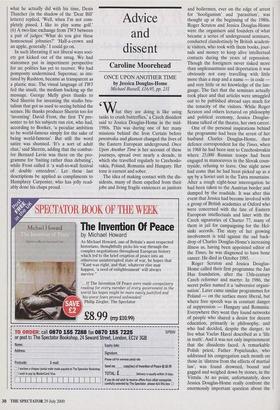Advice and dissent
Caroline Moorehead
ONCE UPON ANOTHER TIME by Jessica Douglas-Home Michael Russell, £16.95, pp. 231 Wat they are doing is like using tanks to crush butterflies,' a Czech dissident said to Jessica Douglas-Home in the mid- 1980s. This was during one of her many missions behind the Iron Curtain before perestroika and glasnost changed the lives of the Eastern European underground. Once Upon Another Time is her account of these journeys, spread over nearly a decade, in which she travelled regularly to Czechoslo- vakia, Poland, Romania and Hungary. Her tone is earnest and sober.
The idea of making contact with the dis- sidents, many of them expelled from their jobs and living fragile existences as janitors and boilermen, ever on the edge of arrest for 'hooliganism' and 'parasitism', was thought up at the beginning of the 1980s. Roger Scruton and Jessica Douglas-Home were the organisers and founders of what became a series of underground seminars, conducted clandestinely by British academ- ic visitors, who took with them books, jour- nals and money to keep alive intellectual contacts during the years of repression. Though the foreigners never risked more than unpleasantness and deportation it was obviously not easy travelling with little more than a map and a name — in code and very little or no knowledge of the lan- guage. The fact that the seminars actually took place and that articles were smuggled out to be published abroad says much for the tenacity of the visitors. While Roger Scruton and others lectured on philosophy and political economy, Jessica Douglas- Home talked of the theatre, her own career.
One of the personal inspirations behind the programme had been the arrest of her husband Charles Douglas-Home, then defence correspondent for the Times, when in 1968 he had been sent to Czechoslovakia where 25,000 Russian troops had been engaged in manoeuvres in the Slovak coun- tryside, refusing to leave. One night news had come that he had been picked up as a spy by a Soviet unit in the Tatra mountains. After a rough eight-hour interrogation he had been taken to the Austrian border and dumped by the roadside. It was after this event that Jessica had become involved with a group of British academics at Oxford who were concerned with the fate of Eastern European intellectuals and later with the Czech signatories of Charter 77, many of them in jail for campaigning for the Hel- sinki accords. The story of her growing involvement is told against the sad back- drop of Charles Douglas-Home's increasing illness as, having been appointed editor of the Times, he was diagnosed to have bone cancer. He died in October 1985.
Roger Scruton and Jessica Douglas- Home called their first programme the Jan Hus foundation, after the 13th-eentury Czech reformer and martyr. In 1986, the secret police named it a 'subversive organi- sation'. Later came similar programmes for Poland — on the surface more liberal, but where free speech was in constant danger of suppression — Hungary and Romania. Everywhere they went they found networks of people who shared a desire for decent education, primarily in philosophy, and who had decided, despite the danger, to live what Vaclav Havel described as a 'life in truth'. And it was not only imprisonment that the dissidents faced. A remarkable Polish priest, Father Popieluszko, who addressed his congregation each month on those in 'distress from the effects of martial law', was found drowned, bound and gagged and weighed down by stones, in the Vistula. At no point, unfortunately, does Jessica Douglas-Home really confront the enormously important question about the extent to which foreign contacts help or harm dissidents, a question that continues to be vital today.
With the coming down of the Berlin Wall the need for the missions ended. By the early 1990s many of the dissidents were back in former jobs and careers. To read Jessica Douglas-Home's book is to be reminded of the days that now feel far in the past, when to dissent from the Party line, or to circulate samizdat material, was to risk what were then the worst abuses of human rights. It is hard not to feel a kind of nostalgia for the time when Peter Bene- son founded Amnesty in order to campaign for the 'forgotten prisoners' in the Soviet countries. For since that day the map of violations has fundamentally altered, with torture, mass deportations and genocide across Africa, Asia and the Balkans the current concerns of the human rights world, though censorship and free expres- sion remain as crucial as ever. As for the former Soviet countries, Jessica Douglas- Home is far from optimistic• 'Far from re- connecting to their past,' she writes, 'the people find themselves dragged into the seedy back streets of mafioso capitalism.'



























































 Previous page
Previous page